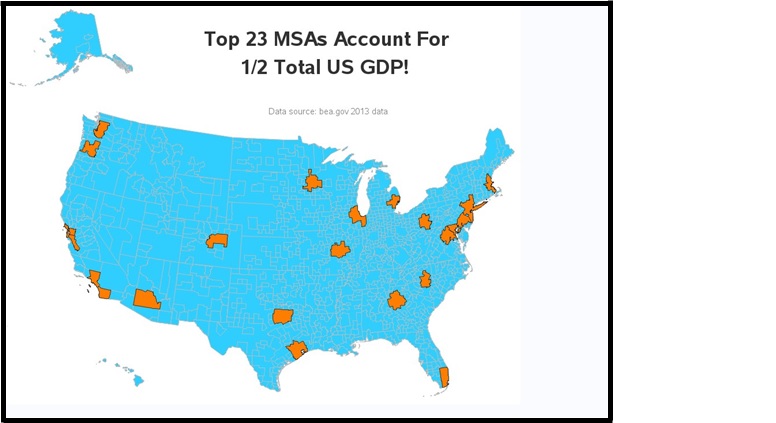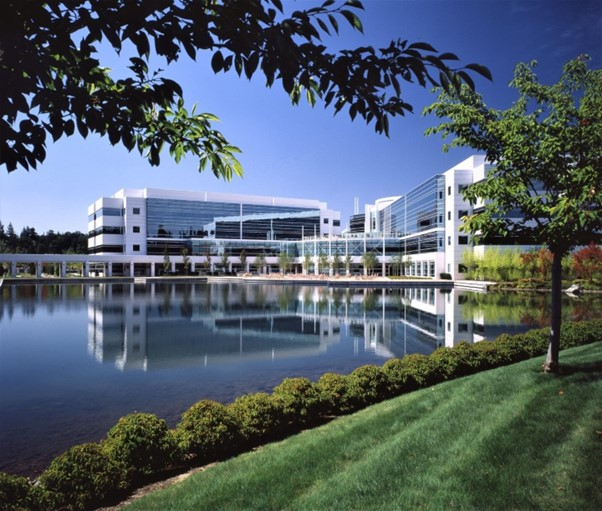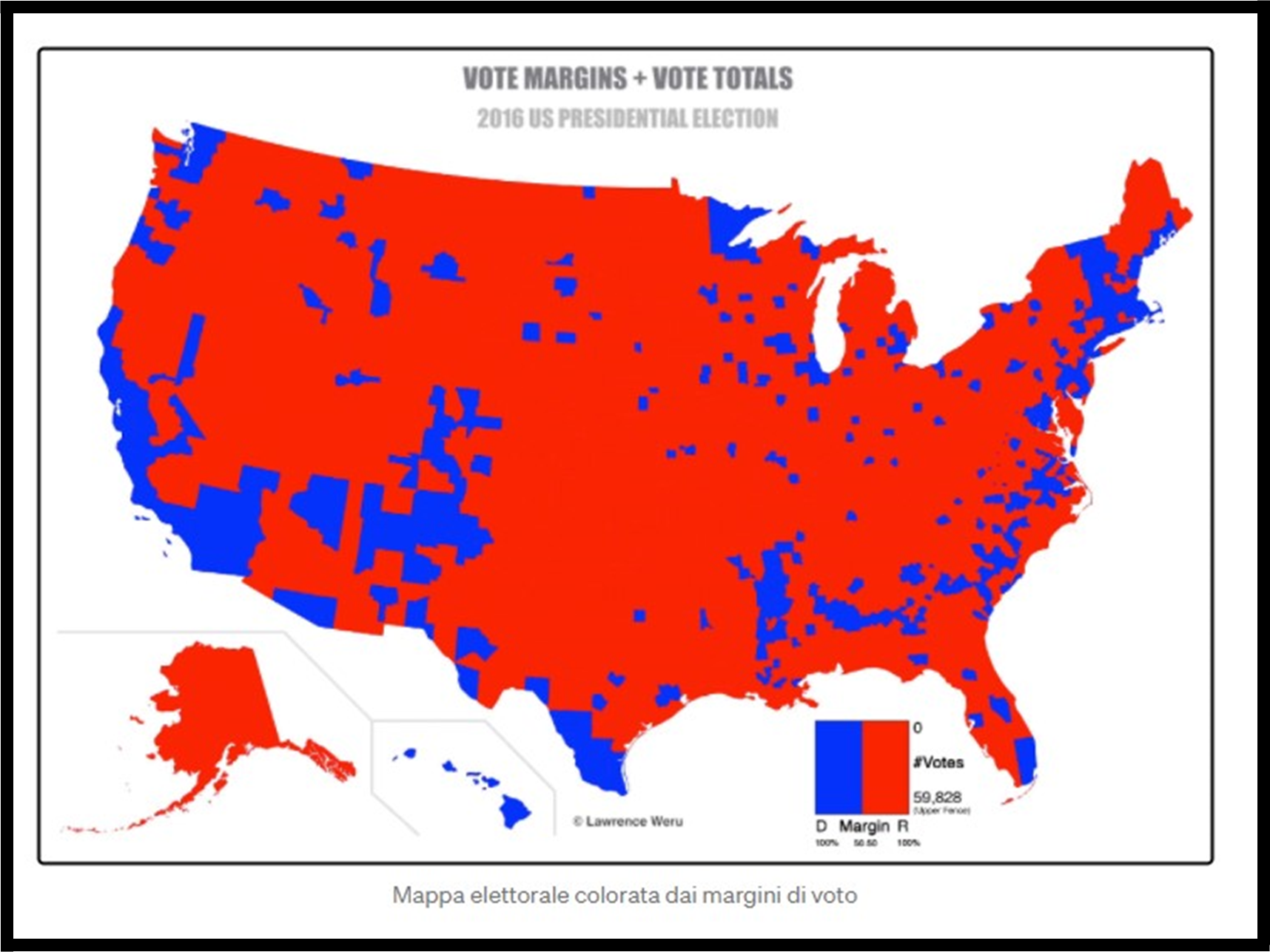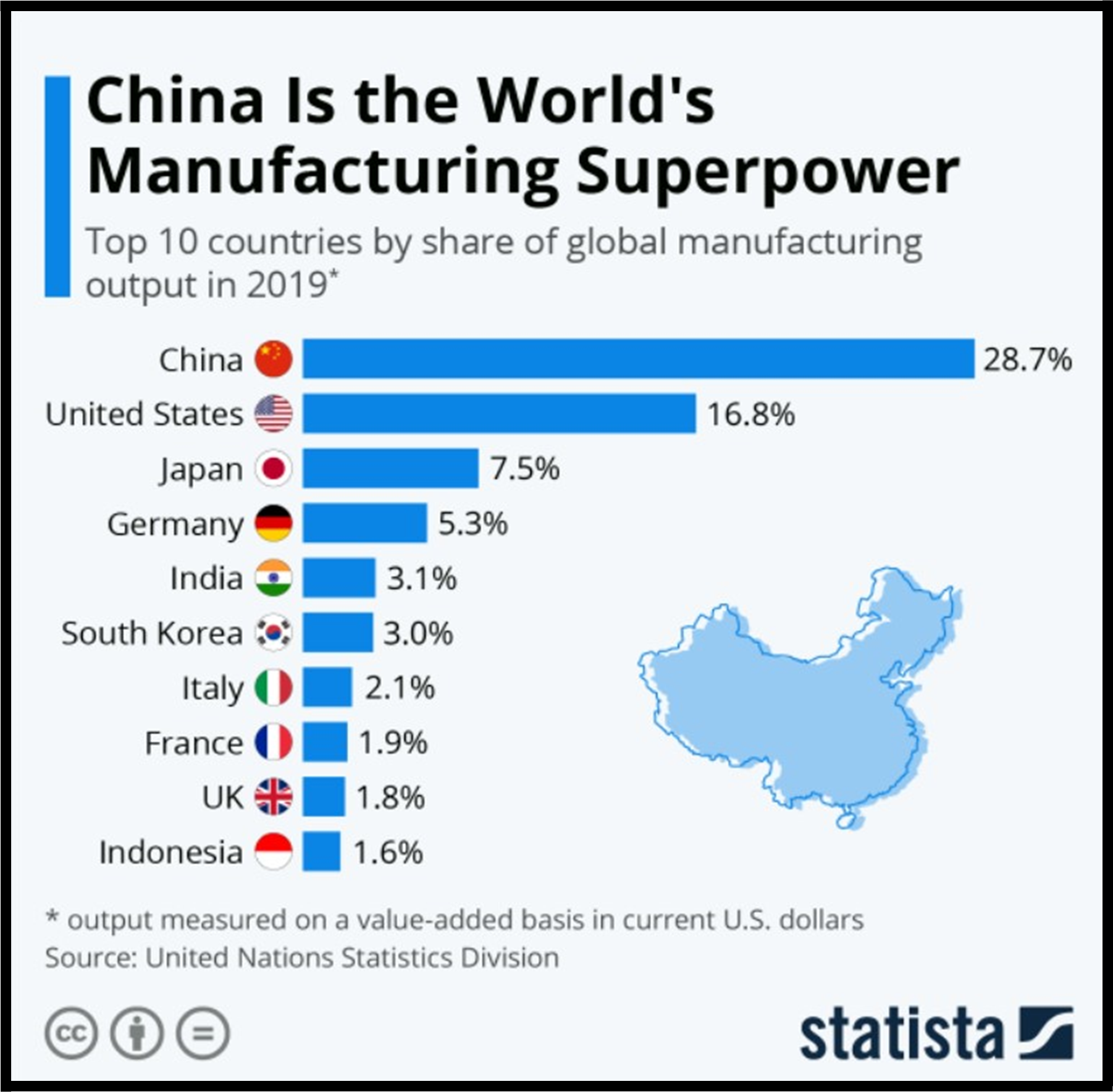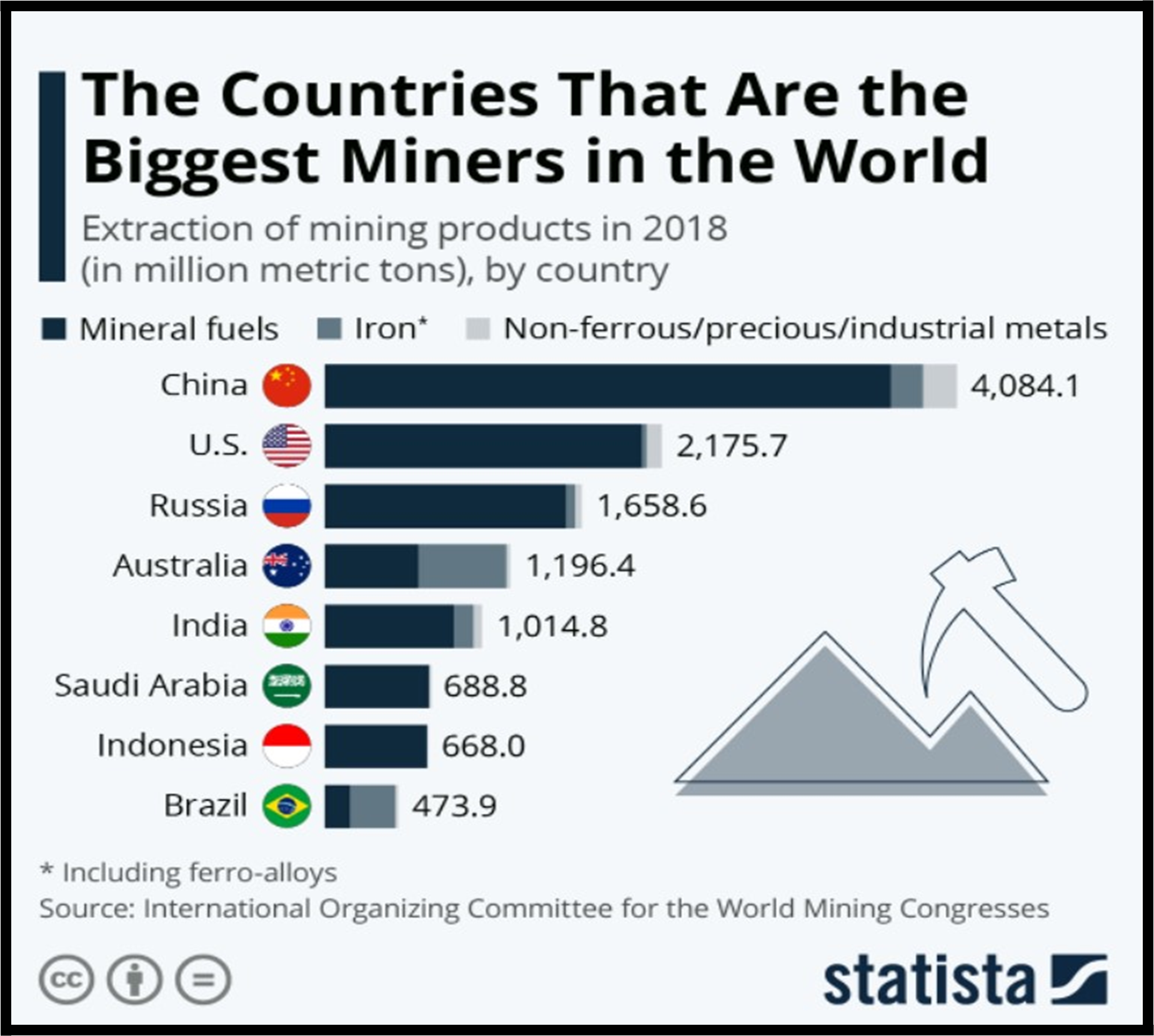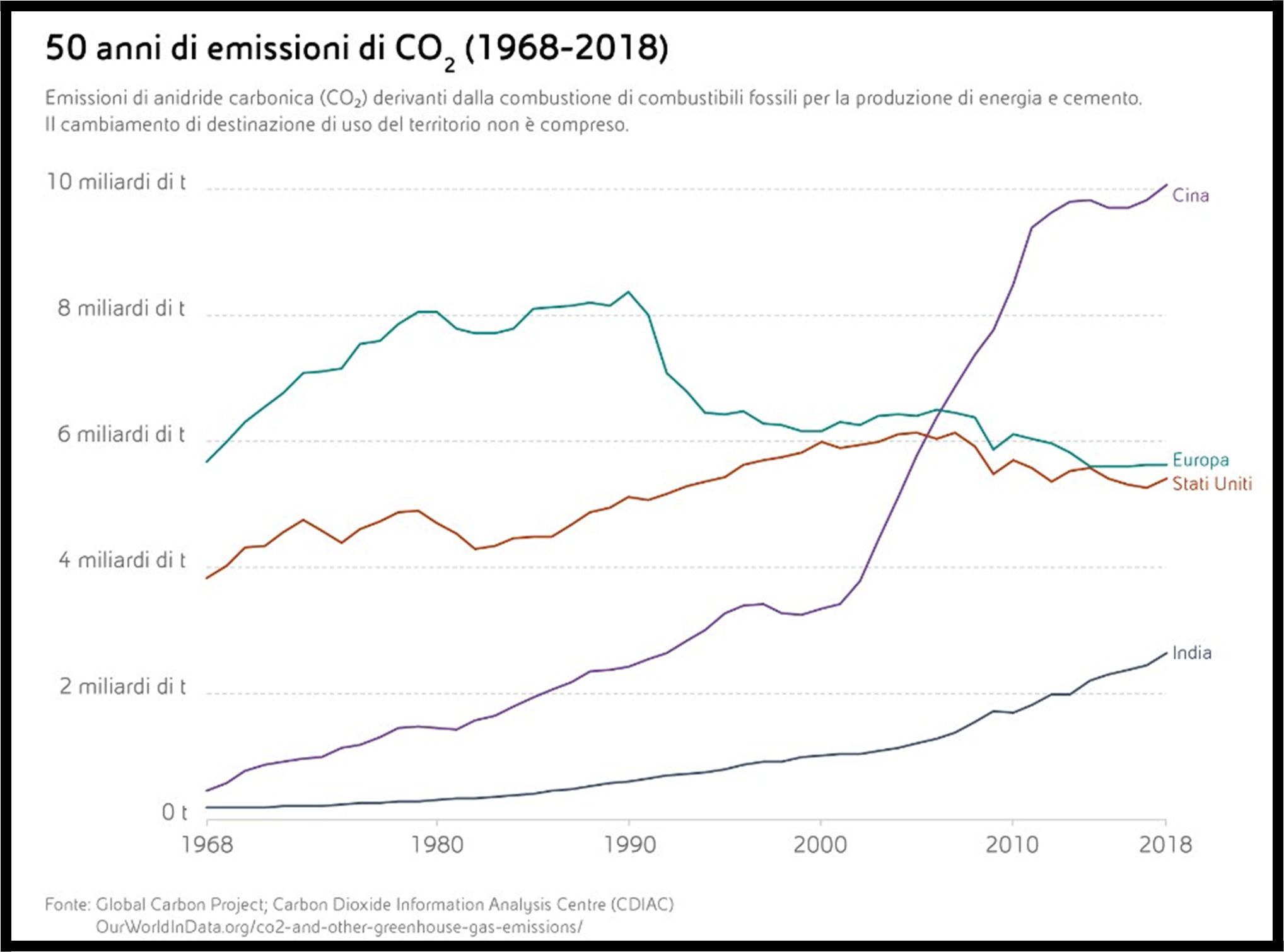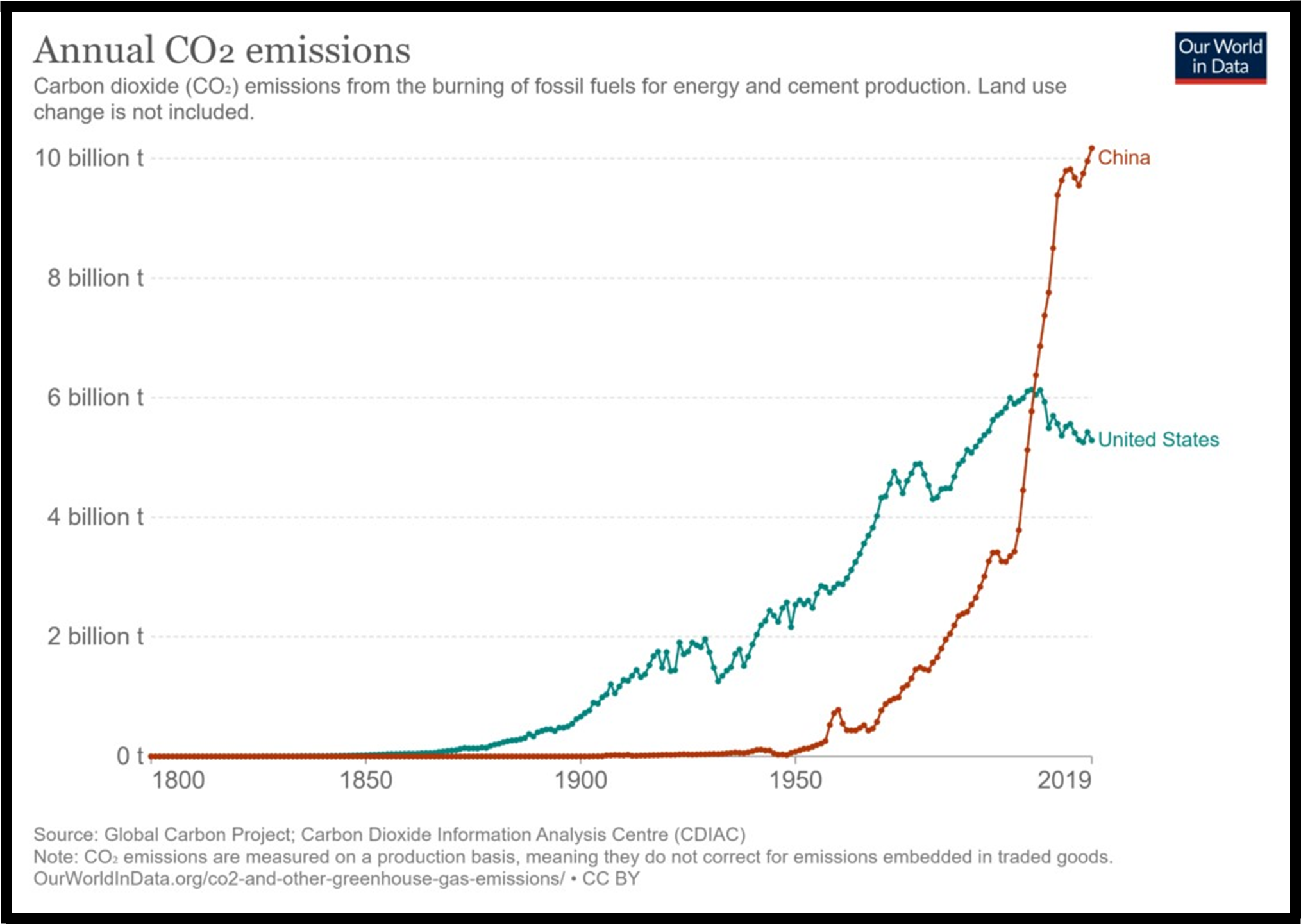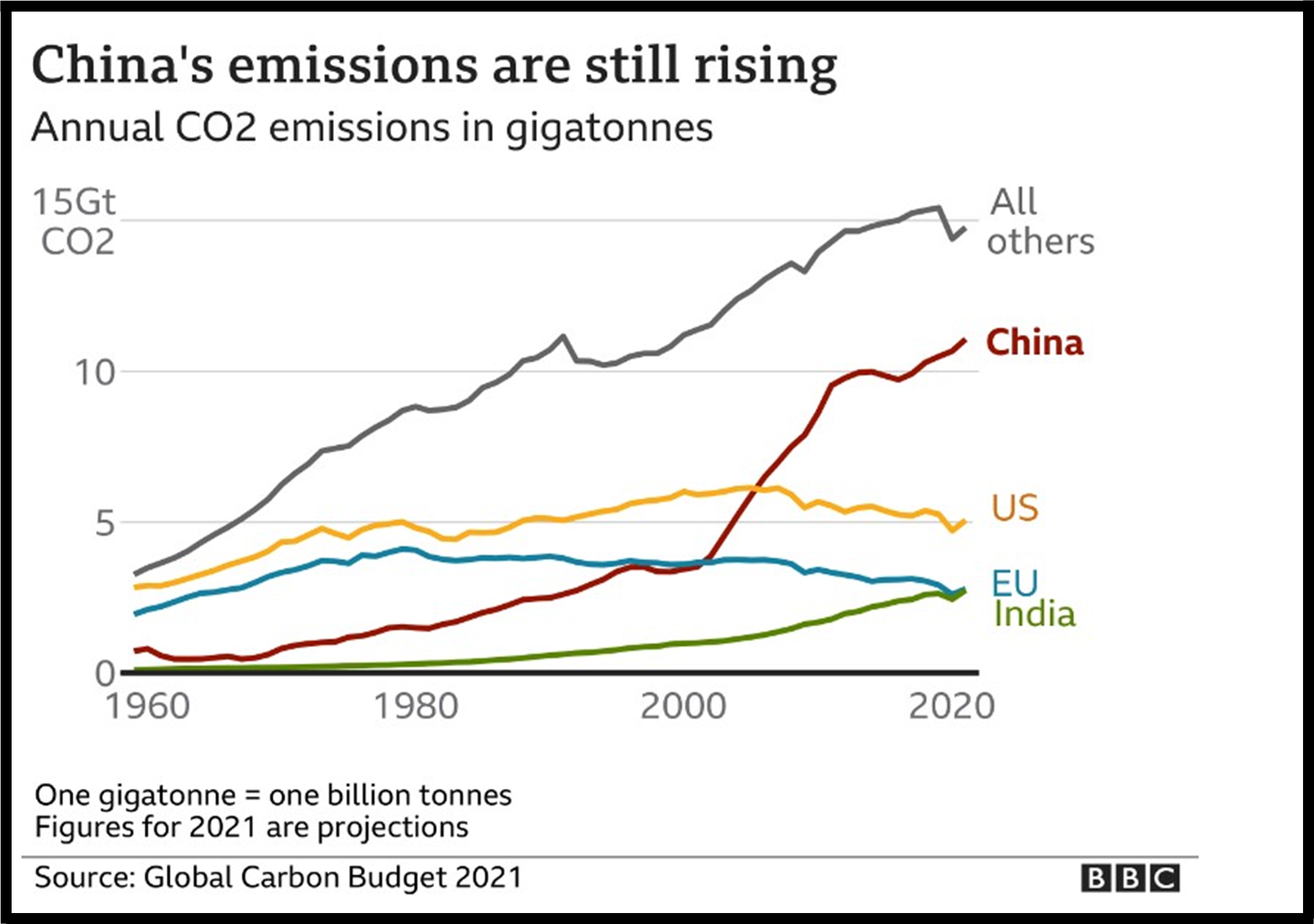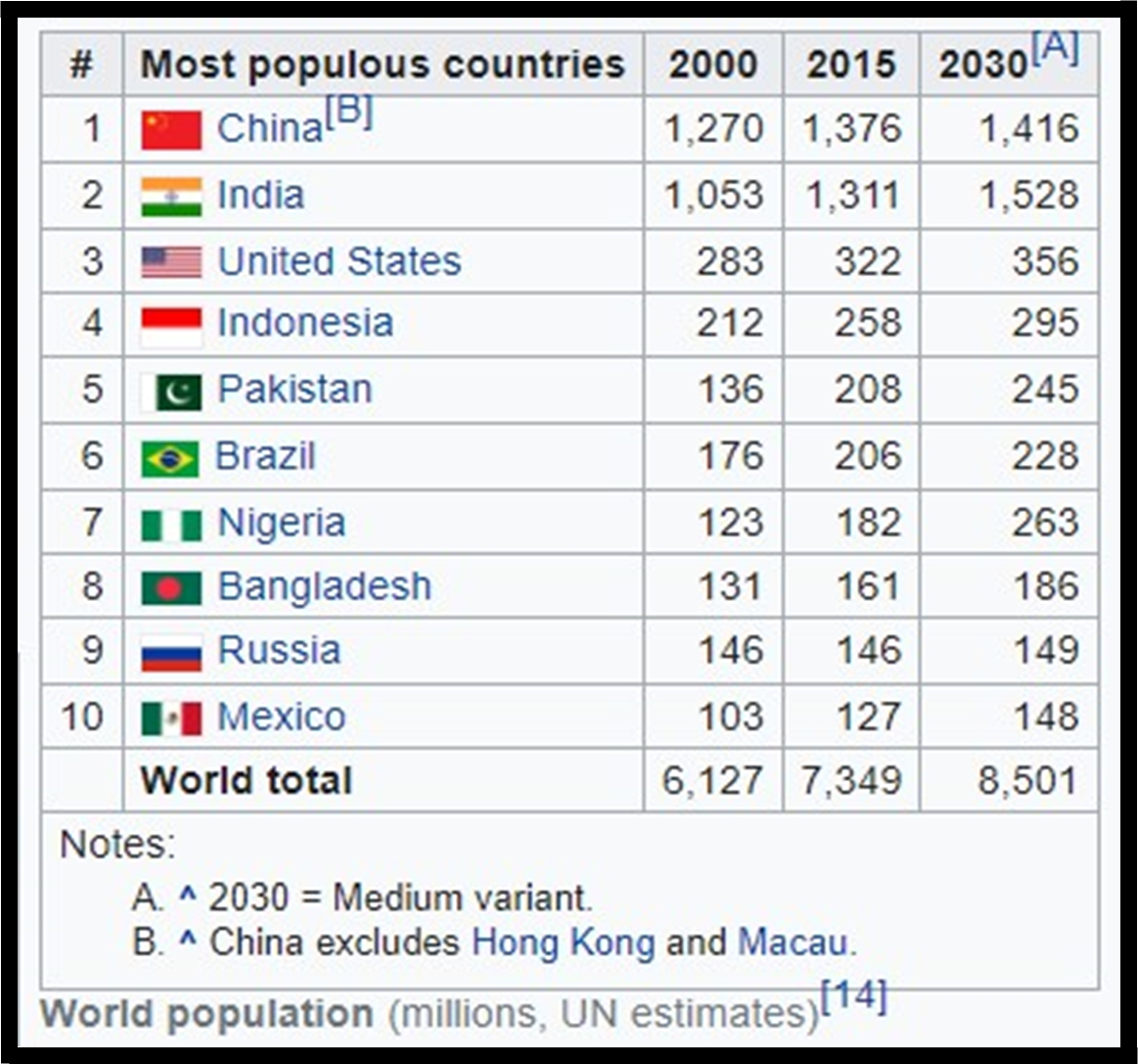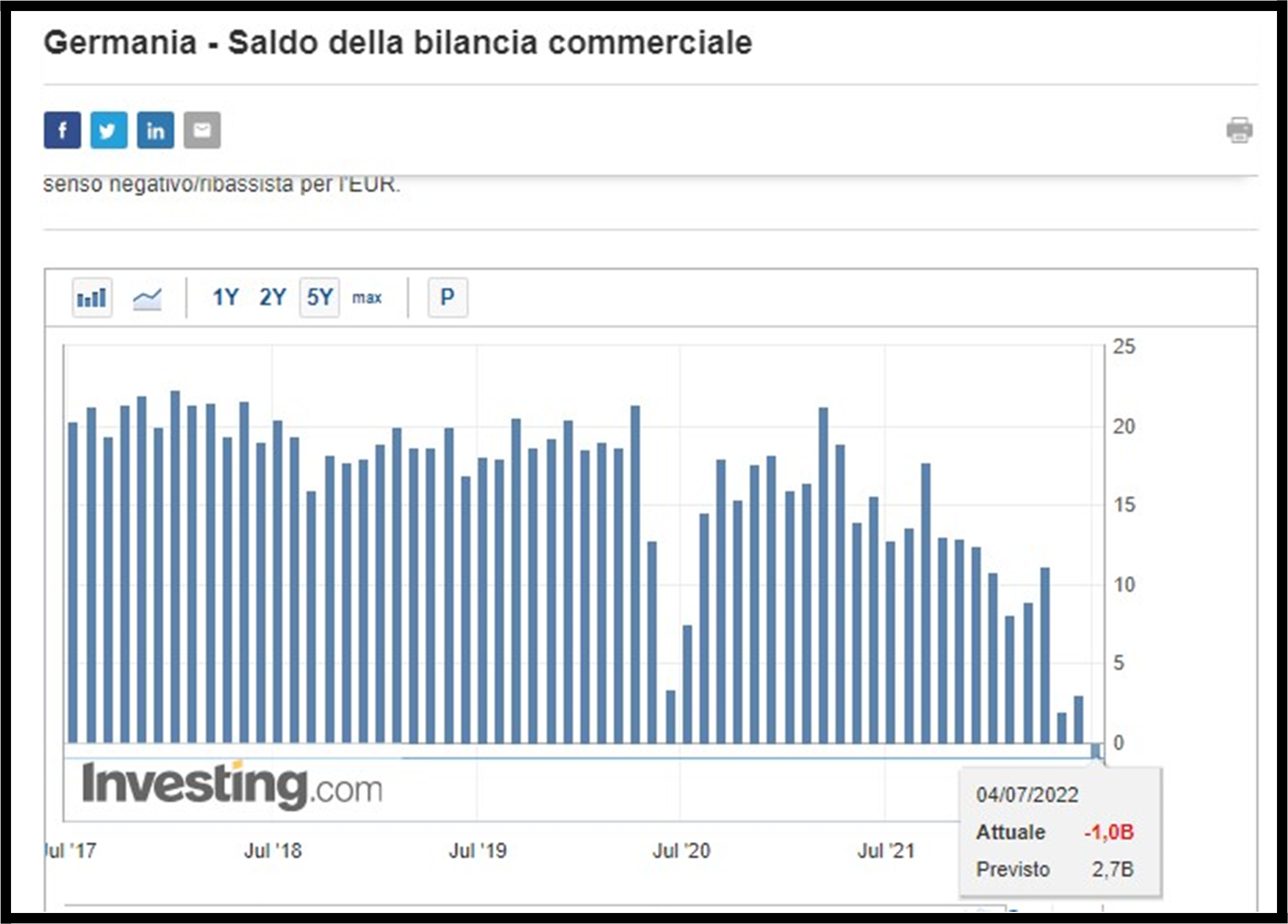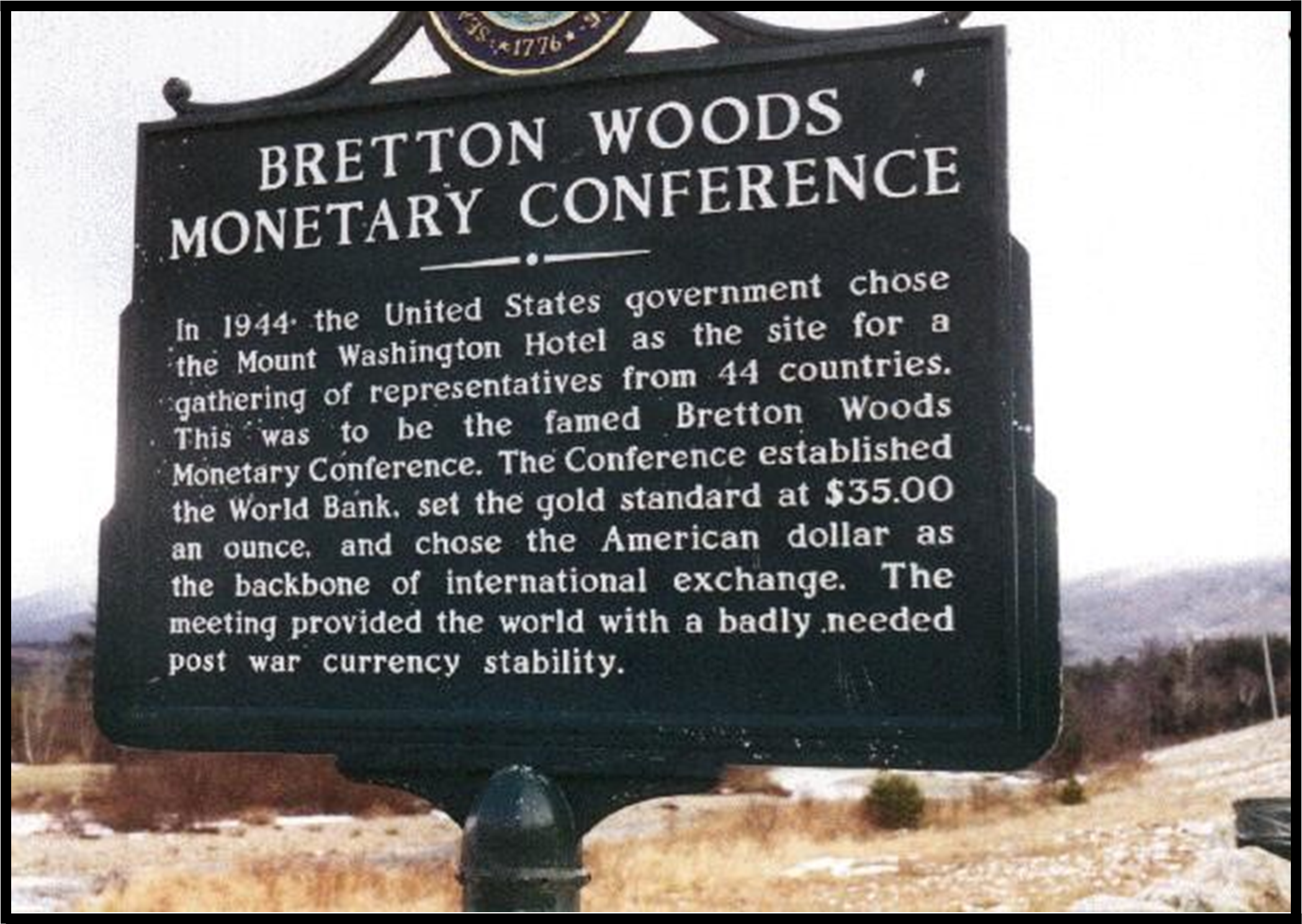THE DEMATERIALIZATION OF THE ECONOMY AND ITS POLITICAL, CULTURAL AND GEOPOLITICAL CONSEQUENCES. edited by Primo Gonzaga

THE DEMATERIALIZATION OF THE ECONOMY AND ITS POLITICAL, CULTURAL AND GEOPOLITICAL CONSEQUENCES.
edited by Primo Gonzaga
THE AREAS OF THE UNITED STATES WHERE THE FUTURE IS MADE
Areas colored in orange produce 50% of US GDP
I would like to start from a famous infographic created by an American statistician (Trubetskoy) and then taken up and elaborated by others as well.
The glance is immediate: the very small areas (orange) produce half of the GDP (GDP in English) of the United States.
This map is from 2013 but is still very current. On the east coast, it is easy to recognize the areas of NY and Boston, the financial heart of the world, while on the west coast, Los Angeles with its media industry, San Francisco and Silicon Valley and further north, Portland and Seattle, headquarters of giants such as Microsoft, Amazon or Nike just to name a few. The economy here is very rich and dematerialized. In these areas multimedia contents are produced and the software that runs the world platforms is written, the financial capitals (Wall Street) that own the world are managed directly or indirectly, or the brands of objects that are then physically products in very distant areas (eg Nike and Apple) .
Restricted areas with a relatively small population with huge per capita incomes. In these areas of the United States the future is being planned, both from an economic and cultural point of view and thanks to the transmission belt of the big media (in a large part of Western countries owned by finance) and the entertainment industry, the models elaborated here are transported all over the world.
In the images, the Apple and Nike headquarters make the new cultural philosophy underlying this model immediately visible: futuristic buildings, attention to greenery, work environments suitable for developing creativity and which also provide spaces for leisure and sport. A wealthy and in many respects idyllic society.
Here the model of the Green Economy was born; on the other hand, to move capital with a click, produce software or make films and TV series, very little energy is needed and the income produced makes those who work there rich. Sport itself becomes more and more entertainment and a few super-paid stars move in a muffled and very rich environment thanks to TV rights.
Here's an example: with the salaries of three players from Los Angeles, the expenses of all 16 teams in the Italian basketball championship are paid: all expenses, not just the salaries of the players. (Davis, James and Westbrook are earning over $120 million this year)
It is within this social and economic climate, where everything is immaterial , where producing physical things is, to most, now unknown, that new trends are born which the big media then relaunch and emphasize:
- Environment becomes a MUST, a trend but also the long-term goal of the economy . In the muffled and welcoming environments of Apple or Microsoft where apps to be used all over the world are developed or in Hollywood Studios where fiction is created that will be seen by millions of people, a world without oil and gas is developed, where cars are electric and emission-free. It doesn't matter if the electricity will then be produced with oil or coal elsewhere, if cryptocurrencies need immense energy to sustain themselves, the model that is elaborated and spread here is that of a planet without fossil fuels, a model idyllic that through the entertainment industry is spread throughout the world.
- Overcoming the traditional family . The family and children are no longer one of the primary goals of life, relationships are sexual liquid, the family becomes open, unstable, the desire to have children becomes more and more a choice of the individual and not of the family couple. The sacrifice of parents for their children is replaced by the search for their own well-being and self-realization. the top priority is the ego, now, and not the children and the long-term future. There is a film by Woody Allen "As long as it works" that summarizes all these concepts. Traditional values are overcome without asking moral or philosophical reasons: as long as it works.
- Physical health that transcends to become almost religion . The priority is personal health, in this context diets with supplements were born first and then real food philosophies, vegan, vegetarian, raw food, fruitarian, macrobiotic, etc. The diet is sometimes linked with the expectations of environmental preservation and in some areas it almost becomes a distinctive element that borders on the creation of political pressure groups.
USA: FROM THE ECONOMY TO POLITICS
Let's use one more image: the map of the 2016 US presidential election, the one in which Trump was elected. (The 2020 one is very similar). It is possible to superimpose the two maps and see that the Blue coloring (DEM) roughly corresponds to the orange areas of the Trubetskoy map while the Red one (REP) to the rural and manufacturing industry areas.
I'm not interested in discussing who wins or loses the elections (which in any case, both in 2016 and 2020, were played for a few thousand votes) but to point out:
- the polarization of wealth is concentrated in a few areas and these are majority blue (DEM)
- the division of the country between areas of the old economy (agriculture, industry, mining) and the new economy (software, finance, entertainment)
- the polarization of the vote with Democrats representing the population of the wealthiest areas and Republicans representing rural areas and more traditional manufacturing sectors.
THE REST OF THE WORLD: PRODUCERS OF GOODS AND CO2
China is now the largest manufacturing country in the world. The graph you see below shows that China now produces as much as the USA, Japan and Germany combined.
The world is still based on energy and mineral products. And here too China and Russia together outnumber the United States, while Europe is practically non-existent.
Shifting manufacturing to China and India has also caused shifting carbon dioxide (CO2) emissions. While Europe and the USA are reducing emissions, China and more recently India are on the rise. China and India are quietly using coal and oil to produce energy and steel. Globally CO2 emissions are not reducing, on the contrary they tend to increase, but the use of low-cost energy further favors the shift of production to Asia to the detriment of manufacturing in Europe and the United States.
The effect on a global level and on the climate is irrelevant or even negative. The effect on industry in the West is disruptive, because the prices charged by India and China, also thanks to the almost total lack of respect for environmental regulations, lead market western productions. Manufacturing In the USA, Germany and Italy fails or relocates. Even in cases where, through finance, control of production is maintained, in the medium term, Western countries will inexorably lose the skills needed to produce many types of goods.
All the graphs, elaborated from different sources, always indicate the same phenomenon, we have transferred (and not reduced) CO2 emissions.
WORLD DEMOGRAPHY: THE BRICS DOMINATE
Finally, last but not least, demographics.
The table below, drawn up by the United Nations, unequivocally highlights the increase in the population of the so-called BRICS. Trend that is destined to last.
The BRICS today have a population of over 3 billion people against the 800 million of the G7 countries. Furthermore, the populations of Brazil, Russia, India, China and South Africa are on average young and growing rapidly, while that of Western countries is aging rapidly.
EUROPE IN ECONOMIC DECADION
Europe is following the US model in all respects but without having the strength to do so. In particular, the main EU countries, Germany, Italy, France are manufacturing countries but leaders in mature sectors (automotive, production of industrial plants, clothing, furniture for the home, etc.) and instead have no leadership in the sectors with the greatest development: Software, entertainment, military aerospace industry.
Relocation destroys entire sectors, but without them being replaced by innovative companies and productions. Furthermore, decarbonisation is making all manufacturing products more expensive and sometimes even unsustainable compared to Indian or Chinese competitors.
Even the German mercantilist model, based on efficiency and low prices to compete and export all over the world, has entered a crisis in recent months. For the first time the German trade balance has gone negative (It hasn't happened since 1991)
THE WAR IN UKRAINE (the welding of Russia, China and India and the financial system)
The economic consequences of the war in Ukraine in the current geopolitical environment can be disruptive.
Here we do not want to go into the merits of the war, of the actions in the field or on ethical questions (very important but not the subject of this analysis).
We have previously highlighted the enormous differences between two models, which in extreme synthesis we could schematically identify in the dematerialized and green world which is opposed to that of the producers of physical goods and raw materials. from Bretton Woods (July 1944) to today the world economy has been Dollar centric.
The international payment system was based on the US dollar. The system held up even when in 1971 Nixon unilaterally announced the non-convertibility of the dollar into gold. Since then, the United States has become the world's buyer of last resort, with a trade balance that is always constantly passive: the only country to be able to maintain such a strong imbalance essentially because the whole world has accepted payments in $. In other words, everyone agreed to be paid in printed (and therefore paper) money instead of US goods.
All commodities up to now have been traded and paid for in Dollars (with some exceptions for the Euro). Now with the sanctions against Russia all the Russian $ reserves in the Western banking system have been blocked. At that point Russia asked for payment in rubles for its supplies of gas and oil. If Russia manages to get its supplies paid in Rubles which is already happening for China and India and demonstrates the real possibility of detaching itself from the Dollar-centric system, this would set a very dangerous precedent for the current international financial system born in Bretton Woods in 1944 and would ratify the financial welding of the Russian economy with China and India. The loss of financial power would be far worse, and would do terrible damage to the US leadership, than a military defeat in Ukraine.
YOU NEED TO ASK YOURSELF FUNDAMENTAL QUESTIONS:
- Can a very small minority of the population of the United States, albeit very rich and with control of world finance and the big media, maintain power in the United States and through American military power control the main geopolitical dynamics of the world?
- Historically, military strength has always been the prerogative of the economically strongest states. In the past, however, the economy was based first on land (agriculture) and then on manufacturing (industry) and on the control of raw materials. Can a system maintain control of the world economy when production and many raw materials are located in other sovereign states?
- Western media push for a transformation of western production processes: the creation of the so-called “green economy”, and this relentless repetition of concepts affects the western population and politicians, but has no hold on the BRICS countries. Can the West afford to wipe out many productions (steel, automotive, shipbuilding) in just a few years without losing the fundamental elements for its survival?
- Because in the long run the BRICS should continue to produce goods and sell raw materials to a West which in exchange supplies non-material activities such as software, entertainment and finance. In other words, can the United States continue to be the dominant power by giving up most of the physical productions?
WHAT TO DO
If the West and the United States in the first place will be able to develop a strategy that gives concrete answers to these questions, perhaps the USA and Europe will be able to maintain their strength and continue to be world leaders, alternatively the decline will be inevitable, and as always happens will also be very quick.
We mention here only summarily and by points what to do:
- Bring back the values that have made the West great, starting with the value of human life and freedom.
- Return to a policy that sets medium and long-term objectives.
- Strengthen internal production capacity.
- Bring Finance back to the service of Production.
- Weave alliances with as many countries as possible, proposing a win-win policy and not merely power policies aimed at overwhelming possible allies by passing the costs on to them.
- Return to a policy of sharing wealth (today in the USA wealth is increasingly concentrated as shown in the first figure).
We are faced with epochal choices
It is no coincidence that the first two points pertain to values and politics. Without restarting from the founding values of the West, everything else will be useless.
First Gonzaga
(May 2023)

Thanks to our Telegram channel you can stay updated on the publication of new articles from Economic Scenarios.
The article THE DEMATERIALIZATION OF THE ECONOMY AND ITS POLITICAL, CULTURAL AND GEOPOLITICAL CONSEQUENCES. edited by Primo Gonzaga comes from Scenari Economici .
This is a machine translation of a post published on Scenari Economici at the URL https://scenarieconomici.it/la-smaterializzazione-delleconomia-e-le-sue-conseguenze-politiche-culturali-e-geopolitiche-a-cura-di-primo-gonzaga/ on Mon, 31 Jul 2023 07:00:37 +0000.

